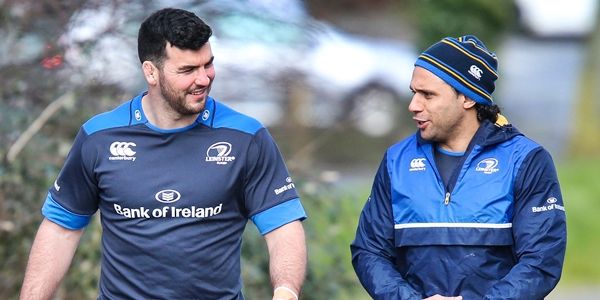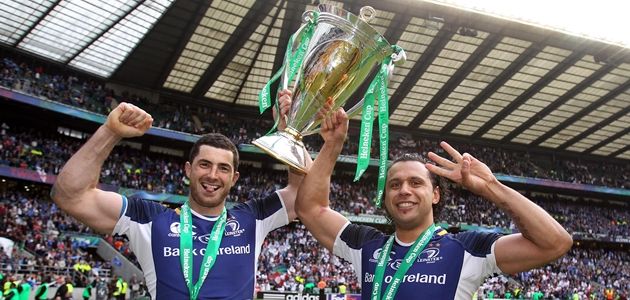It was December 2015 and I remember sitting in the stands of the Aviva Stadium and looking down at Leinster’s right-wing and thinking ‘this is it. This is it for Isa Nacewa’.
Nacewa had taken two seasons out of professional rugby to try his hand at coaching before then coming out of retirement in 2015 and returning to a vastly different Leinster team to the side he had left.
Nacewa left Leinster as a PRO12 champion in 2013 but he returned to the province over two years later and found himself playing on the wing for a side that had lost three consecutive Champions Cup pool games and were staring down Champions Cup elimination by the time Toulon had arrived at Lansdowne Road a week before Christmas.
Toulon were bidding to win their fourth consecutive European title that season and Nacewa looked at sea defensively against a team that had some of the finest attacking talent in world rugby at that stage.
He had gambled on a first-half intercept which ultimately led to a Juan Smith try.
In the second-half he was slow at getting out of the line to shut down Matt Giteau and was saved only by the slippery hands of Drew Mitchell who bombed what had looked like a potential try.
He then gambled again on another intercept on an offload to Ma’a Nonu that ultimately led to a Mitchell try and a Toulon win.
Nacewa had left Leinster as a 31-year-old at the peak of his powers and he returned to the province as a 33-year-old that looked like he would be primarily used as a sounding board for a first-year coach in Leo Cullen and as a role model for a playing squad that looked and played like a shadow of their former selves.
Evidently, I was wrong, but I was not the only one. This was former Ireland captain Donal Lenihan’s initial reaction when he heard that Nacewa would be returning to Leinster for a second stint with the club.
“I think that’s a strange decision,” he said.
“If a guy hasn’t played a game in two years, what are you basing the signing on? Great players retire. It doesn’t mean they can come back after two years, not having played a match, and be as good as they were.”
We were wrong. We were both definitely wrong. But that was then and this is now.
Instead of having Dave Kearney on the wing against Toulon, Leinster now have James Lowe poised to start against Racing. Instead of Ben Te’o they now have Garry Ringrose. Robbie Henshaw over Luke Fitzgerald. James Ryan over Mike McCarthy. The list goes on and Leinster do too.
Who would have thought that when Leinster were eliminated by Toulon that Nacewa would be the player preparing to start on the wing for Leinster in a Champions Cup final in 2018 and that Fitzgerald – five years younger than him – would be the one sitting on the sidelines as a television analyst.
Rugby can be cruel and unforgiving in the case of Fitzgerald but it’s been kind to a 35-year-old that is playing some of the best rugby of his life in the final season of what has been a remarkable career.
Nacewa’s skillset and versatility is what you’ll often hear mentioned when teammates or coaches are asked to describe him as a player and maybe it’s these attributes that have allowed him to survive as an older player in what is very much a young man’s game.
After all, Nacewa has been able to thrive this season as a 35-year-old in a backline where the average age is just under 27.
He may not be the same athlete that he was when Leinster won their first European Cup in 2009 but he’s still found a way to be supremely effective at an age where his skills and feel for the game are as sharp as they ever has been.
“He was a very talented young player,” Scarlets head coach Wayne Pivac noted of Nacewa last month when he first broke through at Auckland in 2003.
“A lot of skill, he was only 18 or 19 when he went from the academy into the Auckland side. The thing about Isa back then was that he had a great skill-set, mature for his age back then and he could play a number of positions.
“He’s continued to do that over a long career, he’s been a fantastic player, he’s been a true team guy. Certainly, you take a guy like James Lowe out and put Isa Nacewa in, it’s not a bad replacement.
“At his age he’s been round the block and he’s been part of a lot of winning teams. He brings a lot of experience.”
Lowe, a player that looks like he could be Leinster’s next great New Zealander, was convinced there was something in the water with Nacewa before he signed for Leinster last summer.
He jokingly commented: “When I was growing up he was the man, back in the day, and apparently, he still is! I mean if I’m 35 and running around and looking that good, I’ve taken something I shouldn’t have,” he said with a wry smile.
There is nothing extracurricular with Nacewa it’s just seemingly a player that has reached a level in professional rugby where he’s seen it all before.
You saw something similar happen with Paul O’Connell towards the end of his career when he was able to pick off Australia number eight Ben McCalman from 15 metres away and you can see it now with Nacewa on a near weekly basis.
For example, take the line he ran for this try against Glasgow earlier this season.
It’s a simple switch play but there’s no blazing speed from Nacewa or a brutal show of strength to evade the challenge of a covering defender.
It’s merely his footwork and the choice of line that he takes that creates the try. A simple decision that is made to look easy when it’s executed by one of the brightest rugby minds we’ve seen in Irish Rugby.
Leinster’s route to this year’s Champions Cup final has been largely aided by the arrival of the likes of James Ryan, James Lowe, Dan Leavy, Garry Ringrose, Robbie Henshaw and Tadhg Furlong in recent seasons; players that were either not at the club, on the peripheries, in the academy or still at school when Nacewa first returned from his retirement.
Leinster also brought on Stuart Lancaster as a senior coach the following season after his return and their attack transformed within a single campaign so there’s a lot of factors in the province’s rise from the bottom placed side in their Pool in 2016 to the tournament’s prohibitive favourite just over two years later.
Nacewa has been a constant figure in Leinster’s resurgence, but then again, he’s been a constant presence in all of Leinster’s great Champions Cup sides.
The running joke at the province in 2009 was that Rob Kearney was the best full-back in Ireland, and the best full-back available to the home nations, but the second best at his own province.
Kearney started two Tests for the British & Irish Lions that summer against South Africa while Nacewa started ahead of him for the 2009 Heineken Cup final win over Leicester.
In sport, and indeed life, you often get what you deserve and it’s hard to think of too many players in Saturday’s Champions Cup final with Racing that will be more deserving of a Champions Cup winners medal than Nacewa.
Maybe Jordi Murphy deserves the first major trophy of his provincial career after spending the last seven years at Leinster on the periphery of their Champions Cup and PRO12 final wins.
Maybe Donnacha Ryan deserves another winners medal an entire decade after he first won the Heineken Cup as an unused substitute with Munster in 2008.
Maybe Dan Carter, the greatest player to ever pick up a rugby ball, deserves to win the only major honour that has alluded him in the sport before he leaves Racing at the end of the season.
There will be deserving players all over the pitch in the final on Saturday but for Nacewa, a player who was denied what would have been a certain shot with New Zealand after he played just two minutes for Fiji at the 2003 Rugby World Cup, the Champions Cup would be a fitting farewell for what has been one of the finest careers we’ve seen on these shores.
What do you get for the man that has everything?
Another winners medal and one more day in the sun. Bilbao and Spain awaits.









































